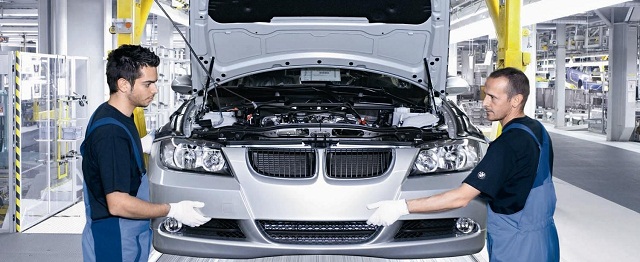Industrial production in Spain, while still in negative territory, improved in August to a considerable extent, to -3.2% from -5.5% in the previous month. The softer contraction rate includes almost all subcomponents of this indicator, “which adds credibility to the data,” said financial analyst A. Vigil.
In his personal note to Barclays clients, Vigil explained that good figures for Spain provide contrast to Germany's, which have negatively surprised. New orders in the country fell by -1.3% when the consensus was -0.5%. This has been the second worst record since October 2010. Capital goods suffered the largest decline with -3% month to month, and then real consumption fell for the third consecutive month.
Geographically, largest declines were registered in orders from the euro zone and domestic demand. Demand from outside the euro zone remains stable with a slight negative trend.
Vigil stresses that along with these bad German data, the latest IMF report on Germany cast a doubt that this is an economy worthy of the name of global growth locomotive. “The German economy as her twin sister the Japanese are based exclusively on the export market, both economies almost always generate surpluses in the current account balance. Both are economies that do not generate growth in others, but use other's growth to grow themselves,” explains the analyst.
On the other hand, there are the economies that depend on domestic growth, such as the U.S.', which are sometimes criticized for their weak finances but that are able to grow with much less volatility and more consistency than the others, due to the development of an innovative, creative economy, capable of generating free new markets for their services sector.
To put IMF findings into context, Vigil talks about the path that the German economy has followed over the past 40 years.
The period of strong expansion in the German economy lasted approximately until the 60's. From then on, full employment increased labor costs, and this brought confidence and business investment down. The answer to that, from the 70's to the 90's was an increase in social benefits to offset the low employment, generally increasing generosity and duration of unemployment benefits, and early retirement benefits.
With the crisis of the 70s and the arrival of competition from emerging countries, Germany began to feel the allure of competition while its GDP averaged only 2.5% between the 70s and the 80s. In this period there was not an increase in domestic demand.
In the 90s, German unification brought more challenges to the country, that earned the nickname of “the sick man of Europe” because it was unable to grow even when the rest of Europe was expanding.
Since 2004, Germany is called the “savior of Europe”. “But is Germany worthy of this name?,” Vigil wonders. “The German industrial engine is becoming less important, and needs to be replaced by a service sector, of which there are no clear signs according to the IMF. German wages, although they have not grown as ours or those of other European countries are particularly high.”
So why does Germany perform well? Because of its high degree of specialization: it specializes in capital goods which have been in high demand during this period of global growth.
“But Germany has not actually gained market share internationally,” remarks this Barclays analyst.
“In addition to this, this type of growth depending from a volatile foreign sector creates more uncertainty, since it does not depend on Germany itself and may be the reason why the country is not experiencing a sounder growth of its domestic demand and for its high risk aversion. Germany's future depends in part on maintaining their niche markets off competition from emerging countries, something difficult to achieve.”
“To conclude, Germany may be living a sweet time right now, but its growth model can in a few years push it back again to the chair of the “sick man of Europe”.
Vigil concludes his analysis highlighting the fact that no one speaks of Germany's need for structural reforms. “I guess it's for the same reason we do not speak about the German financial system, because it is not the right time now, but that time will certainly come.”





